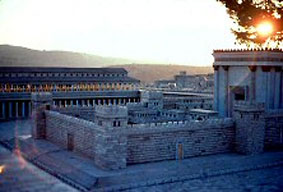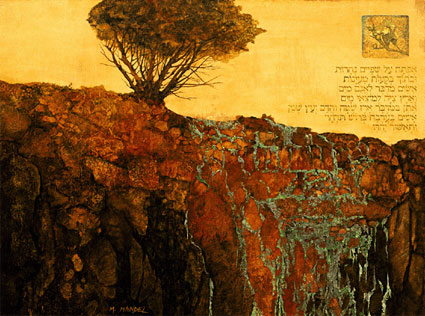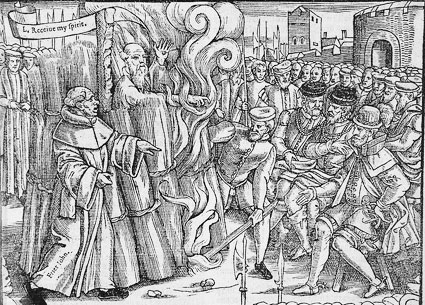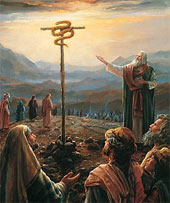Sep
10
2009
 God’s one Law for Adam was temporary. He could eat from the Tree of Judicial Knowledge when mature enough to carry the responsibility. God’s food laws for Israel were also temporary. [1] When the Christ came, and the people of God was brought to maturity, this restricted menu, too, was done away with. It was designed to be outgrown. Not many theologians understand this process of Adam’s “historical maturity”, so they come up with other theories to explain why many Bible truths are not “timeless”. Peter Leithart discusses comments by John Polkinghorne this week:
God’s one Law for Adam was temporary. He could eat from the Tree of Judicial Knowledge when mature enough to carry the responsibility. God’s food laws for Israel were also temporary. [1] When the Christ came, and the people of God was brought to maturity, this restricted menu, too, was done away with. It was designed to be outgrown. Not many theologians understand this process of Adam’s “historical maturity”, so they come up with other theories to explain why many Bible truths are not “timeless”. Peter Leithart discusses comments by John Polkinghorne this week:
Continue reading
Comments Off | tags: Gnosticism, Liberal theology, Peter Leithart | posted in Biblical Theology, Quotes
Sep
7
2009

Solomon Snubs Ally with Trashy Gift
When I was in sales, I was taught that it takes twelve times as much energy to gain a new client as it does to keep an existing one by letting them know they are not taken for granted. Same goes in geopolitics.
James Jordan writes:
One way to understand the relevance of Egypt [during Solomon's reign] is to contrast Egypt with Tyre. Hiram, king of Tyre, had been a loyal ally of David. He loved David. He clearly was a converted man. When Solomon came to the throne, Hiram could not do enough for him. He volunteered to help build the Temple, because Israel’s God was his God also (1 Kings 5). He showered Solomon with gifts (1 Kings 9:11, 14). If there was any nation Solomon should have allied with, it was Tyre.
Continue reading
Comments Off | tags: Bible history, Egypt, James Jordan, Obama, Politics, Solomon, Tyre | posted in Biblical Theology, Quotes
Sep
5
2009

Higher criticism, like the ape-people story, is a fabrication patched together by rebels.
The “potent cause of modern unbelief” (Herbert) is not belief in Biblical infallibility, but a century of disbelieving it.
Dissatisfaction with the traditional view of revelation was not created by the rise of Biblical criticism. Criticism was born out of its denial. Continue reading
Comments Off | tags: Clark Pinnock, Higher Criticism | posted in Creation, Quotes
Sep
1
2009
“…that you may become blameless and harmless, children of God without fault in the midst of a crooked and perverse generation, among whom you shine as lights in the world” Phil. 2:15
Acacias, not Mulberries
 So, acacia wood is at the heart of the Holy furniture. The Tabernacle is a wilderness world glorified by Spirit-filled men and brought into the tent of God,[1] under the wing of Boaz, under the friendly firmament of a new Covenant, under the great tree that grows to shelter the nations.
So, acacia wood is at the heart of the Holy furniture. The Tabernacle is a wilderness world glorified by Spirit-filled men and brought into the tent of God,[1] under the wing of Boaz, under the friendly firmament of a new Covenant, under the great tree that grows to shelter the nations.
Continue reading
Comments Off | tags: AD70, Angels, David, Jewish war, Josephus, Luke | posted in Biblical Theology, Quotes, The Last Days
Sep
1
2009
“The Bible is not a history of poor people struggling under oppression. Nor does the Bible ever give any example of poor people rising up and overthrowing established order. Deliverance, when it comes, comes from people who are not poor helping those who are. The Bible history is a history of wealthy and royal people, giving us an example of how we are to think and live now that we are all wealthy and royal in Christ as members of His Kingdom Body.”
James B. Jordan, Getting Real with the Patriarchs, Biblical Horizons No. 202. Subscribe at www.biblicalhorizons.com
Comments Off | tags: Charity, James Jordan | posted in Christian Life, Quotes
Aug
29
2009

“Faith, without trouble or fighting, is a suspicious faith;
for true faith is a fighting, wrestling faith.”
—Ralph Erskine
Comments Off | posted in Quotes
Aug
27
2009

Desert Trees for a Crystal House
Trees are elementary Bible symbols. James Jordan writes:
We have noted that God’s people are spoken of as trees. Genesis 2 sets up the connection by saying that both men and trees come out of the ground (Genesis 2:7, 9). We have mentioned already such passages as Psalm 1 and Judges 9, where trees symbolize men. An interesting sidelight on this symbolism is provided in Mark 8:24, where the blind man healed by our Lord initially saw men as trees walking.
Continue reading
Comments Off | tags: Havilah, James Jordan, Tabernacle, Worship as commerce | posted in Biblical Theology, Quotes
Aug
25
2009

Daily Dose of Doug:
Yesterday at church I saw a bumpersticker on a friend’s car that summarizes a lot of things wonderfully. “Never trust a theologian who hasn’t been executed.”
Continue reading
Comments Off | tags: Doug Wilson, Martyrdom | posted in Quotes
Aug
20
2009

Peter Leithart writes:
Matthew quotes Isaiah 53:4 to explain how Jesus removes illness and uncleanness (Matthew 8:17). Jesus radiates life, and that life heals the sick and raises the dead. Jesus also accepts death and uncleanness on Himself, to be borne away on the cross. Continue reading
Comments Off | tags: Culture, Peter Leithart, Temple | posted in Quotes
Aug
18
2009
How were the gentiles related to Passover?
By watching it, and putting faith in it.
 In order for a stranger to eat Passover, he had to circumcise himself and his household (Ex. 12:45-49). If he did so, he became “like a native of the land” (v. 48). We are so accustomed to connecting Passover with the Lord’s Supper that it seems strange to consider that perhaps Passover was only for the priestly people, but such was the case. Converted gentiles were not to eat of it unless they were circumcised, and thereby were incorporated into the seed line of Abraham. Did this exclude them from salvation? No, it only excluded them from priestly duties. Did it make them second class citizens? Only in the eyes of the Pharisees. Biblically speaking, their downstream cultural labors in Havilah were just as important as Israel’s sanctuary task. After all, if everyone had become an Israelite, then who would mine the gold of Havilah? Who would bring it to the sanctuary? Israel had its task, and the converted nations had theirs.
In order for a stranger to eat Passover, he had to circumcise himself and his household (Ex. 12:45-49). If he did so, he became “like a native of the land” (v. 48). We are so accustomed to connecting Passover with the Lord’s Supper that it seems strange to consider that perhaps Passover was only for the priestly people, but such was the case. Converted gentiles were not to eat of it unless they were circumcised, and thereby were incorporated into the seed line of Abraham. Did this exclude them from salvation? No, it only excluded them from priestly duties. Did it make them second class citizens? Only in the eyes of the Pharisees. Biblically speaking, their downstream cultural labors in Havilah were just as important as Israel’s sanctuary task. After all, if everyone had become an Israelite, then who would mine the gold of Havilah? Who would bring it to the sanctuary? Israel had its task, and the converted nations had theirs.
Continue reading
2 comments | tags: Abraham, Circumcision, James Jordan, Passover, Pharisees | posted in Biblical Theology, Quotes
 God’s one Law for Adam was temporary. He could eat from the Tree of Judicial Knowledge when mature enough to carry the responsibility. God’s food laws for Israel were also temporary. [1] When the Christ came, and the people of God was brought to maturity, this restricted menu, too, was done away with. It was designed to be outgrown. Not many theologians understand this process of Adam’s “historical maturity”, so they come up with other theories to explain why many Bible truths are not “timeless”. Peter Leithart discusses comments by John Polkinghorne this week:
God’s one Law for Adam was temporary. He could eat from the Tree of Judicial Knowledge when mature enough to carry the responsibility. God’s food laws for Israel were also temporary. [1] When the Christ came, and the people of God was brought to maturity, this restricted menu, too, was done away with. It was designed to be outgrown. Not many theologians understand this process of Adam’s “historical maturity”, so they come up with other theories to explain why many Bible truths are not “timeless”. Peter Leithart discusses comments by John Polkinghorne this week:
































